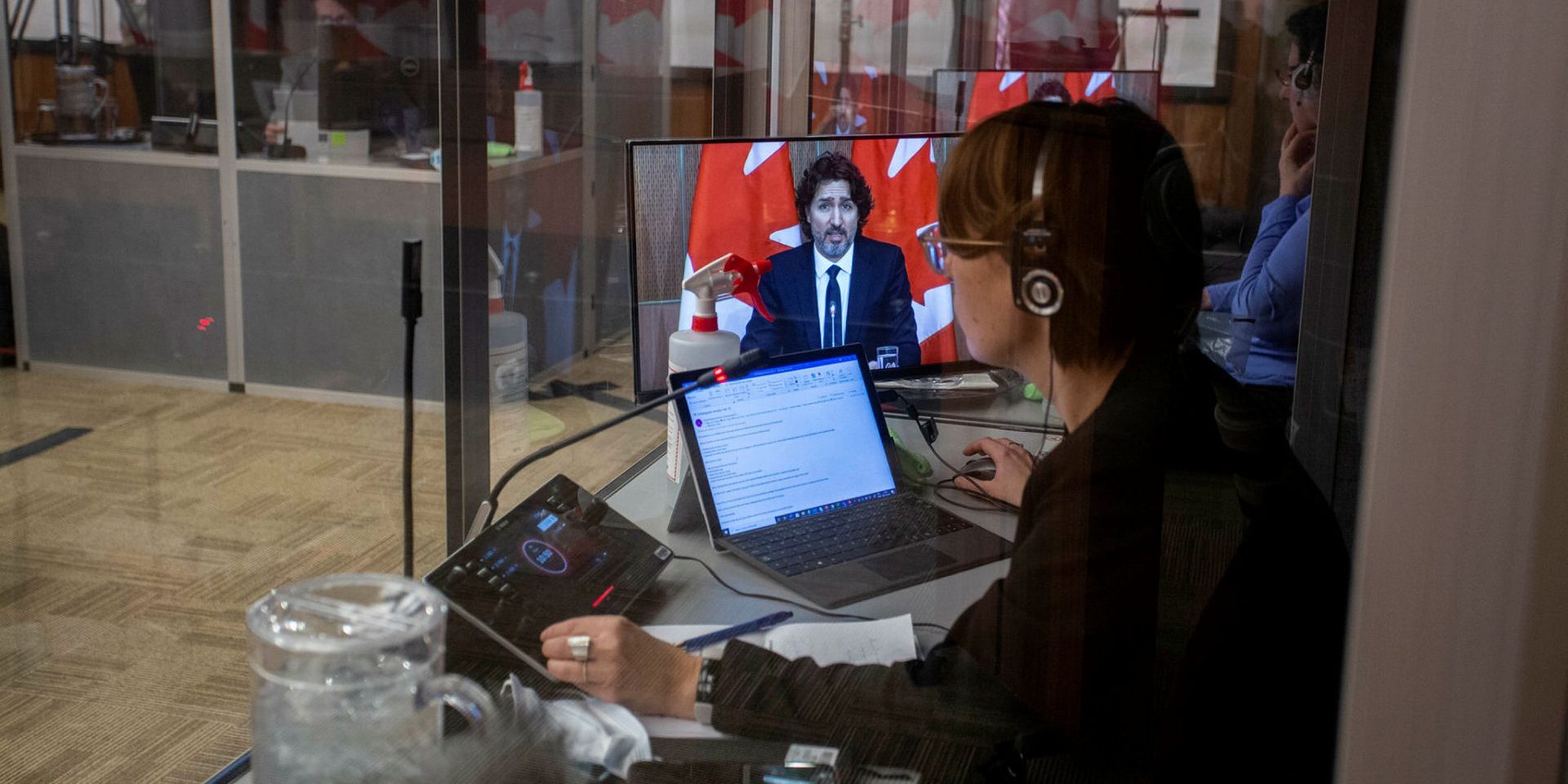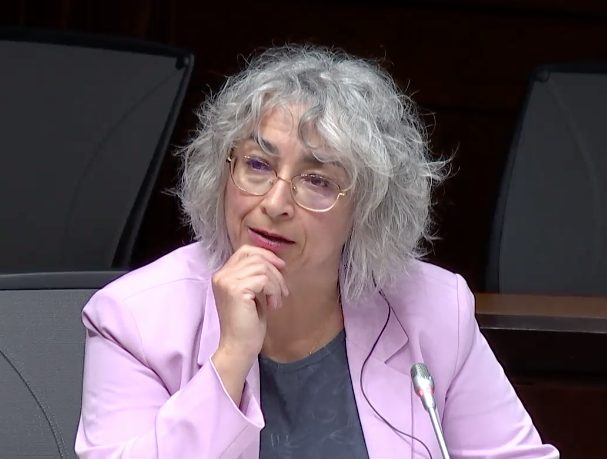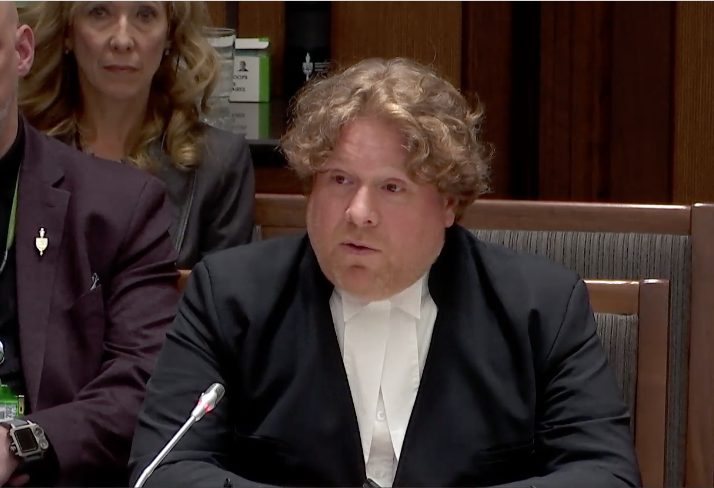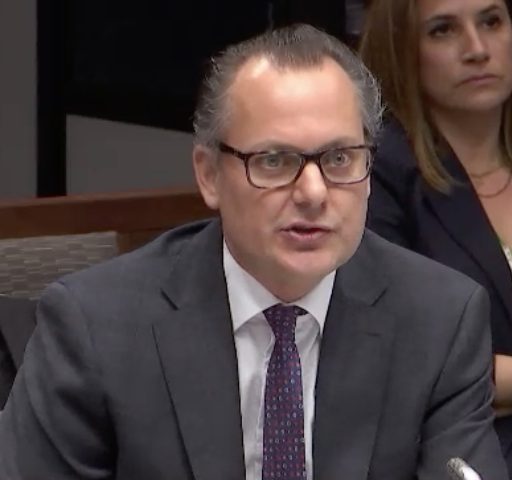Level of House interpretation service a continued cause for concern

MPs on the House Board of Internal Economy expressed their frustration last week over the federal Translation Bureau’s lack of progress in boosting available interpretation service hours, despite continued efforts.
In a recent letter to the Board of Internal Economy (BOIE), the bureau confirmed its ability to maintain current service levels—some 160 hours per week, including 57 two-hour committee meetings and three caucus meetings—next fall. But, as MPs noted during the BOIE’s May 18 meeting, current service levels haven’t been sufficient to curb committee meeting cancellations this spring due to a lack of available resources.
Bloc Québécois Whip Claude DeBellefeuille (Salaberry–Suroît, Que.) noted that last week—which saw the House sit for extended hours until close to, or just past, midnight on May 15, 16, and 17—“several committees” had meetings cancelled.
“In September, we’re starting off with the same level of resources, despite all the efforts made over the past two years, even though we know the current resources don’t enable us to meet the needs of Parliamentarians, both for the House [Chamber] and for committee meetings,” said DeBellefeuille.
“We’re taking for granted that it is standard for parliamentary committees to be cancelled because there’s a shortage of interpreters in this hybrid era … it seems to be standard practice, [that] well, because the House is extended, there are no committees. It’s hard for me to understand why we accept that so easily,” she said, adding she’s “not satisfied” with the Translation Bureau’s answers, or with the response of the minister responsible for the bureau, Public Services and Procurement (PSPC) Minister Helena Jaczek (Markham–Stouffville, Ont.). “I don’t sense a will to change things and do everything possible to achieve change.”
NDP House Leader Peter Julian (New Westminster–Burnaby, B.C.) voiced similar frustration, including over the “insufficient” level of information provided by the bureau, and urged BOIE members to agree to invite Translation Bureau representatives to appear at its next meeting—which they ultimately did.
“Without interpretation, there’s no Parliament. It’s as simple as that. This is a bilingual country. Whether MPs are anglophone or francophone, they need to be able to participate equally,” said Julian. “The fact that we have to cancel so many committee meetings means that we’re in a bit of a crisis in the face of the lack of action that I see.”
In May 2022, the BOIE approved a pilot project to test the use of bureau-accredited interpreters working remotely. While technical feasibility tests took place that July, the pilot didn’t properly kick-off until close to the new year as a result of confusion between the bureau and House administration. A second pilot testing use of external (as in, non-bureau accredited) interpretation services was scrapped by the BOIE last September.
Ian McDonald, clerk assistant with the House committees and legislative directorate, told the BOIE a “small number of meetings to date” have tested remote interpretation in recent months, the results of which “were successful.” (In a follow-up response, PSPC noted those tests were simulations.) In turn, the administration hopes to consult party whips starting this week “to get a sense of their comfort level,” said McDonald. House approval is still required, and there are still some “issues” to sort out, but he said the “hope” is to start “slow” by introducing it for steering committee meetings, which aren’t broadcast and have had little to no interpretation support amid the strain on resources.
Though he couldn’t say exactly how many service hours the remote interpretation option would add, McDonald said it would bring the total “beyond the 160 hours.”
The interpreter shortage that existed in Canada pre-pandemic has been exacerbated by hybrid parliamentary proceedings introduced as a result of COVID-19. The lower sound quality associated with virtual participation has caused an increased rate of injuries, with some staff interpreters taking leave or working part time as a result, and some freelancers opting not to offer services. Additionally, the bureau faces natural attrition and difficulties in attracting interpreters to work on staff (among other things, without the remote option, it currently requires parliamentary interpreters to live and work in the National Capital Region).
The House of Commons continues to operate in a hybrid format, with the current agreement set to expire June 23.
On March 3, the House issued a new template letter for committees to use in inviting witnesses to appear, aimed at encouraging in-person participation. Specifically, a new heading —“If you appear in person”—was added “to indicate the fact that many witnesses are now appearing in person and that travel expenses to Ottawa are covered by the committee,” explained the administration in response to follow-up questions.
“I think we have to concede … [that] most of the problems that we’re dealing with are because we have also chosen to have a hybrid Parliament,” said Conservative Whip Kerry-Lynne Findlay (South Surrey–White Rock, B.C.) during the May 18 meeting.
Senate interpretation service hours return to pre-pandemic levels
There was a decidedly sunnier picture painted when the Senate Internal Economy, Budgets, and Administration Committee (CIBA) heard from Translation Bureau representatives on May 11.
While the “worldwide shortage of qualified interpreters” makes it “unlikely that our capacity will increase significantly in the short term,” the bureau’s CEO Dominic Laporte said “thanks to the sum of all measures that have been taken, we have now returned to the number of hours that we offered to the Senate before the pandemic.”
“This would not have been possible without the extraordinary co-operation we received from the Senate and its administration,” said Laporte.
That number wasn’t specified during the meeting, and when asked by The Hill Times, PSPC provided hours by fiscal year, indicating 5,329 hours were offered in 2022-23, compared to 3,048 hours in 2021-22; 2,746 in 2020-21; 3,124 in 2019-20; and 4,880 in 2018-19.
Noting that “interpretation incidents” last fall “caused a lot of frustration for Senators,” Maxime Fortin, principal clerk with the Senate’s committee directorate, said “considerable” progress has since been made. This is “in large part because of decisions by Senators to encourage in-person participation in parliamentary proceedings and to provide the administration the resources necessary to conduct preliminary technical tests with all virtual participants and to ensure they are equipped with an approved headset,” she said.
Last fall, after a parliamentary interpreter was sent to the hospital after experiencing acoustic shock during a Senate committee meeting in which some remote witnesses didn’t use proper microphone headset equipment, the Senate developed a new, mandatory system to test sound before meetings.
Unlike the House, the Senate opted not to renew hybrid proceedings last September.
Senate committee witnesses are still able to appear virtually, as was possible pre-pandemic. Fortin said of the 525 witnesses who testified during 130 Senate committee meetings held since pre-testing was implemented at the beginning of March, 140 appeared virtually, and interpretation issues delayed seven meetings, interrupted four, and led to one cancellation—a “downward trend” that she said has picked up since April.
The Translation Bureau is being pulled in two directions: to increase capacity to meet the demands of Parliament on one side, and to adequately protect interpreters on the other.
In February, in response to a complaint filed by the Canadian Association of Professional Employees, which represents staff interpreters, Employment and Social Development Canada’s Labour Program ruled the bureau had failed in its responsibility to protect the health and safety of interpreters.
Interpreters currently continue to work reduced hours during virtual sessions as part of precautionary health measures implemented by the bureau.
But the International Association of Conference Interpreters Canada—which counts parliamentary interpreters among its members—recently raised alarm over the bureau’s proposed new open contract for freelancers, which the association said sets out a return to pre-pandemic shift hours, even for virtual proceedings, leaving “no meaningful limits to exposure to potentially harmful remote audio,” as described in an April 12 press release.
During his CIBA appearance, Laporte highlighted a number of steps taken by the bureau of late.
As part of its response to the Labour Program ruling, on April 11, Martin Montreuil joined the bureau as its first-ever director of parliamentary affairs and interpreter well-being. The bureau has also instructed interpreters not to interpret participants who aren’t using proper equipment, and Laporte told CIBA it’s currently developing a “protocol” to help guide such decisions. As well, it commissioned the National Research Council to conduct sound testing in all parliamentary committee rooms. Those tests have been completed and the bureau is now awaiting the audiologist’s report, said Laporte.
“The prevention of injuries remains above all key to maintaining our interpretation capacity and we continue our strenuous efforts,” he told Senators.
Laporte noted that a steering committee made up of “senior leaders” from the Senate, House, and Translation Bureau and aimed at improving communication of issues and the establishment of priorities has been created. An initial meeting is planned for this month, according to PSPC.
The bureau has also increased the frequency of its accreditation exam to twice a year. “This year, one exam will take place late June and one in late fall,” explained PSPC.
Additionally, Laporte noted the bureau has been reaching out to “several” universities in Quebec to encourage them to launch interpretation programs, and is “taking steps” to hire a recruitment agency to encourage more interpreters to join the bureau as staff.
Ten individuals passed last fall’s accreditation exam, all of whom opted to become freelance interpreters rather than join the bureau full time, as Laporte told the BOIE in February. In responding to MP concerns at the time, he noted there is “no miracle recipe to solve everything.”
The Hill Times









 LICENSING
LICENSING PODCAST
PODCAST ALERTS
ALERTS













